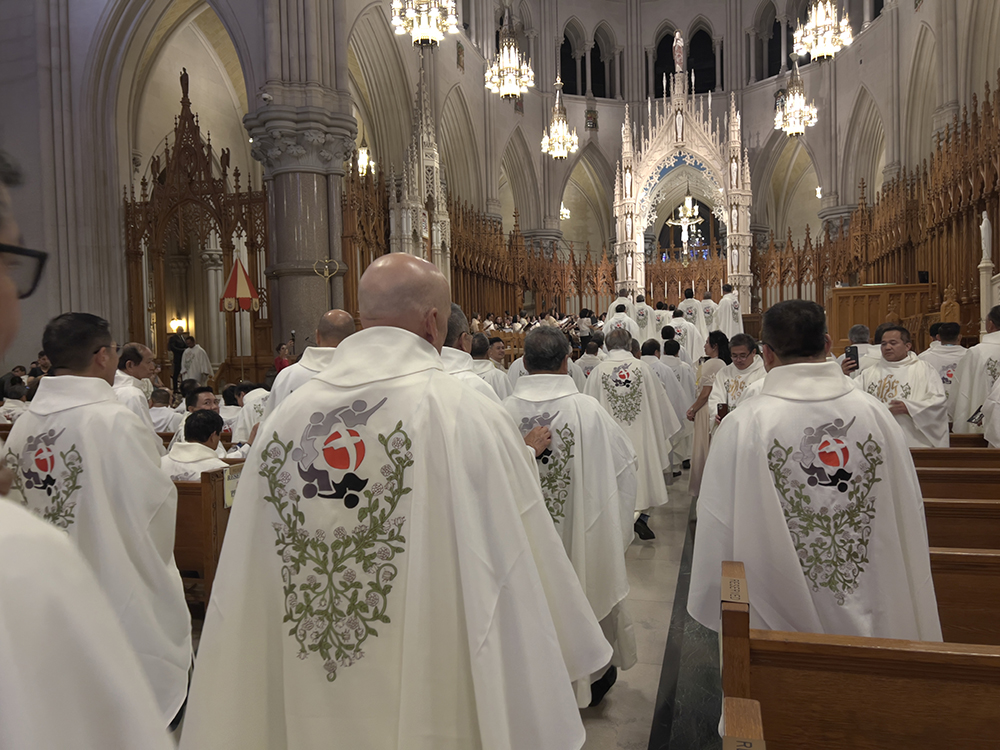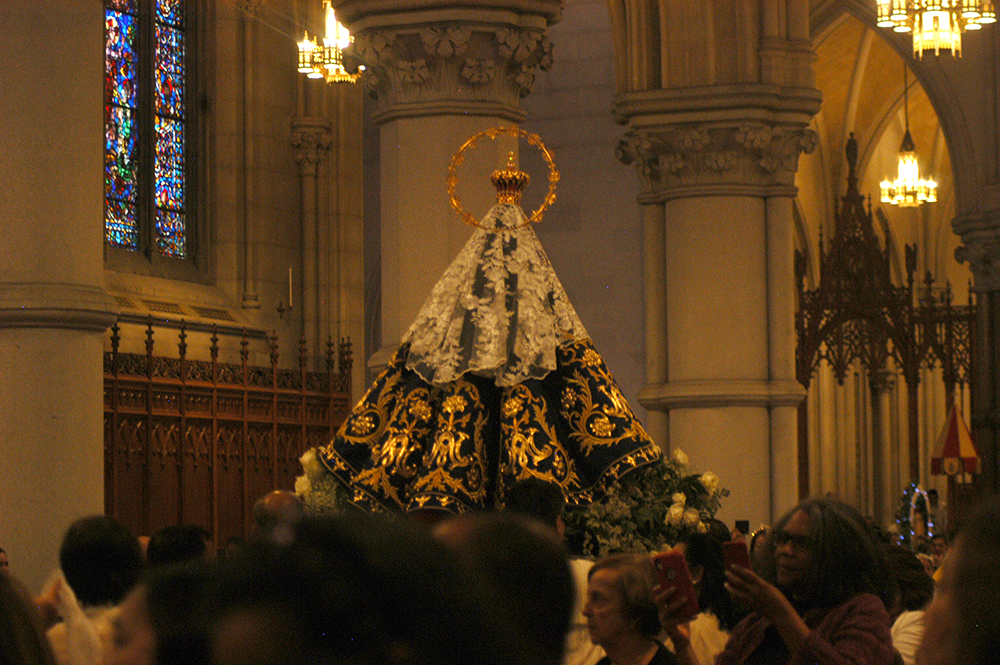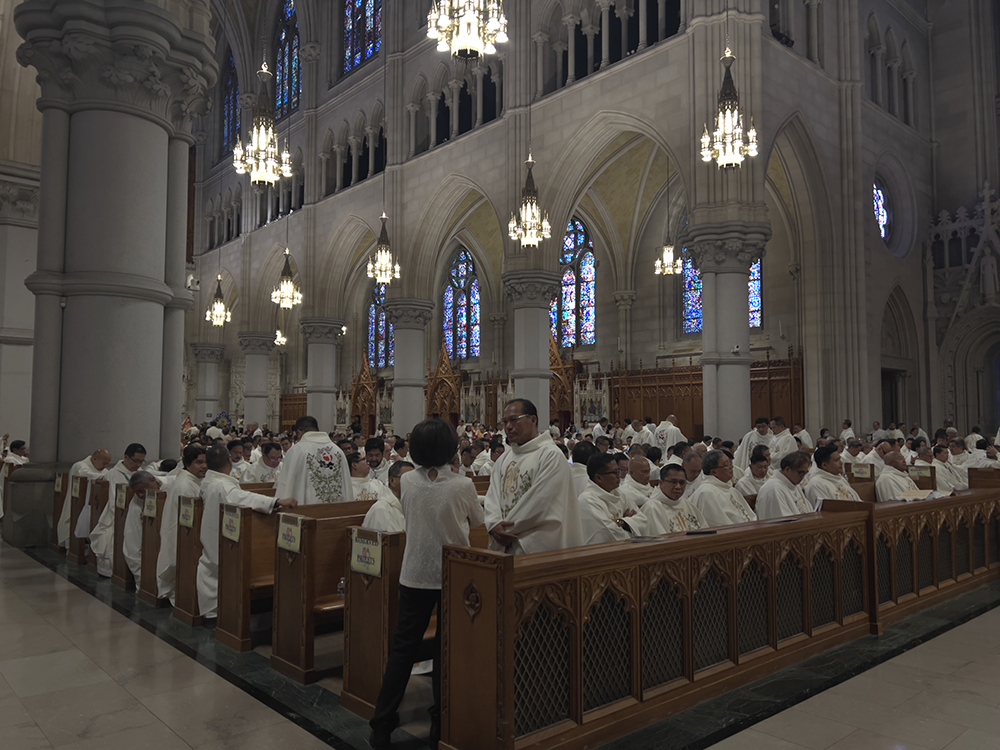There were nearly 400 Filipino priests from across the country at the celebration, said the Diocese of Newark. Each wore a white robe combining the symbol of the synod with FIlipino traditional symbolism. (Photo: Alicia Venter)
NEWARK — After a six-year wait, and a three-hour commute from Florida, Father Percival “Val” DeVera and a handful of his fellow priests from the Diocese of Orlando, finally arrived at a long-desired destination: the Cathedral Basilica of the Sacred Heart in Newark.
There, on Thursday, Oct. 26, they were joined by nearly 400 other priests, all of whom had traveled from across the United States to celebrate their Filipino pride and how it intersects with their Catholic faith.
“We are trying to support each other and have a support system.” said Father DeVera, the pastor at the Church of Our Saviour in Cocoa Beach, Fla. An immigrant from the Philippines, he has been in the United States for around 20 years, but noted: “It’s a good opportunity to come together and reminisce about things back home.”
The celebration was part of the National Association of Filipino Priests (NAFP-USA) Fourth Assembly. The festivities featured a procession of Filipino Catholics that represented aspects of their religious traditions — including Simbag Gabi, a novena leading up to Christmas, and Flores de Mayo, a monthlong devotion to the Virgin Mary — along with a Mass celebrated by Archbishop Gabriele Caccia, the Holy See’s Permanent Observer to the United Nations.
The assembly hasn’t been held since 2017, having been canceled in 2020 amid the COVID pandemic. Nevertheless, it comes at a time when faith remains a stalwart presence in the Filipino community. According to a 2023 Pew Research poll, 57% of Filipinos are Catholic, and 90% of Filipino Americans express some connection to Christianity.

According to the Diocese of Newark, approximately 99% of the priests who attended Thursday’s Mass were believed to be immigrants from the Philippines.
Ellie Wysocki, who immigrated to the United States in 1980 and lives a few miles from Newark, in Edison, was elated when she was told the total number of clergy in attendance at the Mass. The sea of white robes, she said, represented the strength of Christianity in her home country.
“It’s the first time with 400 [Filipino American] priests together. I love to see them, and to help them with their stipends. We need more priests. We need more like them,” Wysocki said.
Archbishop Caccia says the Catholic faith is so strong because it is so diverse. He noted in his homily that It is sometimes perceived that Catholicism is a European faith.
But a view of the pews inside the basilica that day showed otherwise; counting the priests and the laypeople crowded into the sanctuary, nearly 1,000 Filipinos were in attendance. Regardless of where they live in the world, Filipinos bring “the seed of faith,” he proclaimed.
Father Manolo Punzalan, the program director for the assembly and director of the Archdiocese of Newark’s Filipino Apostolate, said the assembly, the Mass, and other festivities allow Filipinos in the United States to stay connected to their culture when they are unable to fly back to their native country.

The NAFP-USA Fourth Assembly ran from Oct. 24-27 — the last week of Filipino American History Month, and also included a celebration at St. Patrick’s Old Cathedral in Manhattan.
“Our lives revolve around faith,” said Father Punzalan, who pointed out that there is something profound in expressing devotion through one’s own traditions. “Although we practice our faith here in America … we would like to do something like we used to in the Philippines,” he added.
Freddy Burke, the Hudson County coordinator for the Filipino Apostolate in the Diocese of Newark, echoed Father Punzalan’s sentiments, saying it is crucial that the Filipinos who immigrate to the United States bring their faith, as well as their native culture with them.
“When they have children and grandchildren, several generations, they pass on that faith to show how important it is that being Filipino [means] you are also Catholic,” Burke said.

